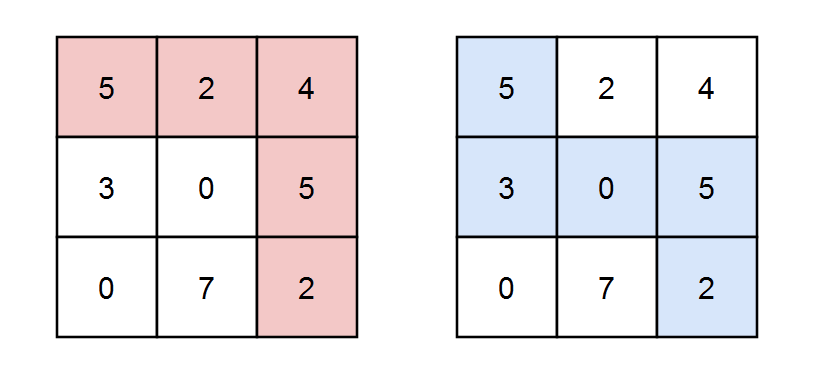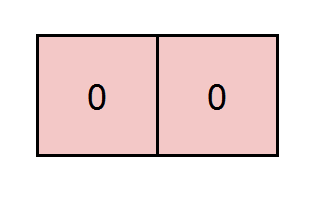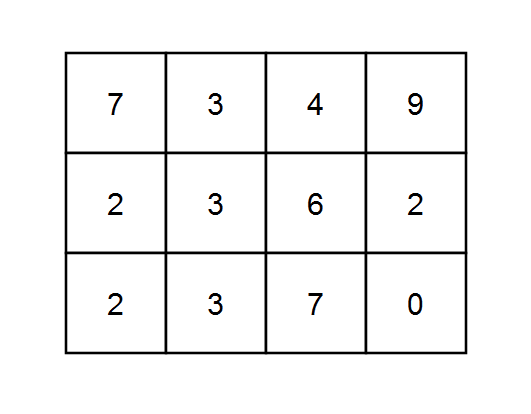| comments | difficulty | edit_url | rating | source | tags | |||
|---|---|---|---|---|---|---|---|---|
true |
Hard |
1951 |
Weekly Contest 314 Q4 |
|
You are given a 0-indexed m x n integer matrix grid and an integer k. You are currently at position (0, 0) and you want to reach position (m - 1, n - 1) moving only down or right.
Return the number of paths where the sum of the elements on the path is divisible by k. Since the answer may be very large, return it modulo 109 + 7.
Example 1:
Input: grid = [[5,2,4],[3,0,5],[0,7,2]], k = 3 Output: 2 Explanation: There are two paths where the sum of the elements on the path is divisible by k. The first path highlighted in red has a sum of 5 + 2 + 4 + 5 + 2 = 18 which is divisible by 3. The second path highlighted in blue has a sum of 5 + 3 + 0 + 5 + 2 = 15 which is divisible by 3.
Example 2:
Input: grid = [[0,0]], k = 5 Output: 1 Explanation: The path highlighted in red has a sum of 0 + 0 = 0 which is divisible by 5.
Example 3:
Input: grid = [[7,3,4,9],[2,3,6,2],[2,3,7,0]], k = 1 Output: 10 Explanation: Every integer is divisible by 1 so the sum of the elements on every possible path is divisible by k.
Constraints:
m == grid.lengthn == grid[i].length1 <= m, n <= 5 * 1041 <= m * n <= 5 * 1040 <= grid[i][j] <= 1001 <= k <= 50
We design a function dfs(i, j, s) to represent the number of paths starting from (i, j) with an initial path sum modulo
For each position
The answer is dfs(0, 0, 0). We can use memoization search.
The time complexity is
class Solution:
def numberOfPaths(self, grid: List[List[int]], k: int) -> int:
@cache
def dfs(i, j, s):
if i < 0 or i >= m or j < 0 or j >= n:
return 0
s = (s + grid[i][j]) % k
if i == m - 1 and j == n - 1:
return int(s == 0)
ans = dfs(i + 1, j, s) + dfs(i, j + 1, s)
return ans % mod
m, n = len(grid), len(grid[0])
mod = 10**9 + 7
ans = dfs(0, 0, 0)
dfs.cache_clear()
return ansclass Solution {
private int m;
private int n;
private int k;
private static final int MOD = (int) 1e9 + 7;
private int[][] grid;
private int[][][] f;
public int numberOfPaths(int[][] grid, int k) {
this.grid = grid;
this.k = k;
m = grid.length;
n = grid[0].length;
f = new int[m][n][k];
for (var a : f) {
for (var b : a) {
Arrays.fill(b, -1);
}
}
return dfs(0, 0, 0);
}
private int dfs(int i, int j, int s) {
if (i < 0 || i >= m || j < 0 || j >= n) {
return 0;
}
s = (s + grid[i][j]) % k;
if (f[i][j][s] != -1) {
return f[i][j][s];
}
if (i == m - 1 && j == n - 1) {
return s == 0 ? 1 : 0;
}
int ans = dfs(i + 1, j, s) + dfs(i, j + 1, s);
ans %= MOD;
f[i][j][s] = ans;
return ans;
}
}class Solution {
public:
int numberOfPaths(vector<vector<int>>& grid, int k) {
int m = grid.size(), n = grid[0].size();
int mod = 1e9 + 7;
vector<vector<vector<int>>> f(m, vector<vector<int>>(n, vector<int>(k, -1)));
function<int(int, int, int)> dfs;
dfs = [&](int i, int j, int s) {
if (i < 0 || i >= m || j < 0 || j >= n) return 0;
s = (s + grid[i][j]) % k;
if (i == m - 1 && j == n - 1) return s == 0 ? 1 : 0;
if (f[i][j][s] != -1) return f[i][j][s];
int ans = dfs(i + 1, j, s) + dfs(i, j + 1, s);
ans %= mod;
f[i][j][s] = ans;
return ans;
};
return dfs(0, 0, 0);
}
};func numberOfPaths(grid [][]int, k int) int {
m, n := len(grid), len(grid[0])
var mod int = 1e9 + 7
f := make([][][]int, m)
for i := range f {
f[i] = make([][]int, n)
for j := range f[i] {
f[i][j] = make([]int, k)
for x := 0; x < k; x++ {
f[i][j][x] = -1
}
}
}
var dfs func(i, j, s int) int
dfs = func(i, j, s int) int {
if i < 0 || i >= m || j < 0 || j >= n {
return 0
}
s = (s + grid[i][j]) % k
if i == m-1 && j == n-1 {
if s == 0 {
return 1
}
return 0
}
if f[i][j][s] != -1 {
return f[i][j][s]
}
ans := dfs(i+1, j, s) + dfs(i, j+1, s)
ans %= mod
f[i][j][s] = ans
return ans
}
return dfs(0, 0, 0)
}function numberOfPaths(grid: number[][], k: number): number {
const MOD = 10 ** 9 + 7;
const m = grid.length,
n = grid[0].length;
let ans = Array.from({ length: m + 1 }, () =>
Array.from({ length: n + 1 }, () => new Array(k).fill(0)),
);
ans[0][1][0] = 1;
for (let i = 0; i < m; i++) {
for (let j = 0; j < n; j++) {
for (let v = 0; v < k; v++) {
let key = (grid[i][j] + v) % k;
ans[i + 1][j + 1][key] =
(ans[i][j + 1][v] + ans[i + 1][j][v] + ans[i + 1][j + 1][key]) % MOD;
}
}
}
return ans[m][n][0];
}We can also use dynamic programming to solve this problem.
Define the state
The initial value is
We can get the state transition equation:
The time complexity is
class Solution:
def numberOfPaths(self, grid: List[List[int]], k: int) -> int:
m, n = len(grid), len(grid[0])
dp = [[[0] * k for _ in range(n)] for _ in range(m)]
dp[0][0][grid[0][0] % k] = 1
mod = 10**9 + 7
for i in range(m):
for j in range(n):
for s in range(k):
t = ((s - grid[i][j] % k) + k) % k
if i:
dp[i][j][s] += dp[i - 1][j][t]
if j:
dp[i][j][s] += dp[i][j - 1][t]
dp[i][j][s] %= mod
return dp[-1][-1][0]class Solution {
private static final int MOD = (int) 1e9 + 7;
public int numberOfPaths(int[][] grid, int k) {
int m = grid.length, n = grid[0].length;
int[][][] dp = new int[m][n][k];
dp[0][0][grid[0][0] % k] = 1;
for (int i = 0; i < m; ++i) {
for (int j = 0; j < n; ++j) {
for (int s = 0; s < k; ++s) {
int t = ((s - grid[i][j] % k) + k) % k;
if (i > 0) {
dp[i][j][s] += dp[i - 1][j][t];
}
if (j > 0) {
dp[i][j][s] += dp[i][j - 1][t];
}
dp[i][j][s] %= MOD;
}
}
}
return dp[m - 1][n - 1][0];
}
}class Solution {
public:
const int mod = 1e9 + 7;
int numberOfPaths(vector<vector<int>>& grid, int k) {
int m = grid.size(), n = grid[0].size();
vector<vector<vector<int>>> dp(m, vector<vector<int>>(n, vector<int>(k)));
dp[0][0][grid[0][0] % k] = 1;
for (int i = 0; i < m; ++i) {
for (int j = 0; j < n; ++j) {
for (int s = 0; s < k; ++s) {
int t = ((s - grid[i][j] % k) + k) % k;
if (i) dp[i][j][s] += dp[i - 1][j][t];
if (j) dp[i][j][s] += dp[i][j - 1][t];
dp[i][j][s] %= mod;
}
}
}
return dp[m - 1][n - 1][0];
}
};func numberOfPaths(grid [][]int, k int) int {
m, n := len(grid), len(grid[0])
var mod int = 1e9 + 7
dp := make([][][]int, m)
for i := range dp {
dp[i] = make([][]int, n)
for j := range dp[i] {
dp[i][j] = make([]int, k)
}
}
dp[0][0][grid[0][0]%k] = 1
for i := 0; i < m; i++ {
for j := 0; j < n; j++ {
for s := 0; s < k; s++ {
t := ((s - grid[i][j]%k) + k) % k
if i > 0 {
dp[i][j][s] += dp[i-1][j][t]
}
if j > 0 {
dp[i][j][s] += dp[i][j-1][t]
}
dp[i][j][s] %= mod
}
}
}
return dp[m-1][n-1][0]
}

